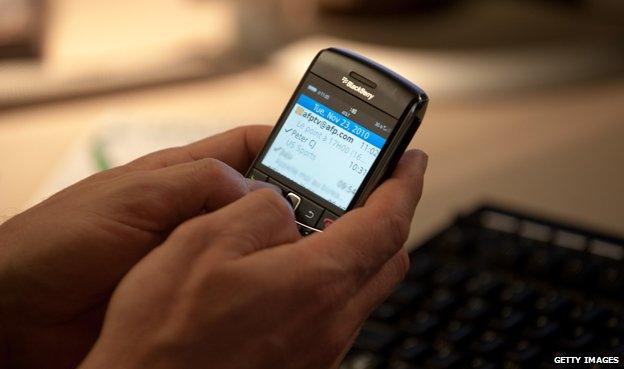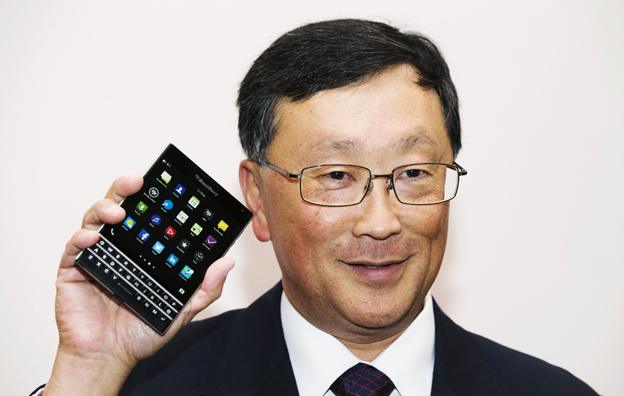Blackberry's Passport to a better future
- Published
- comments
Rory Cellan-Jones tries out the new Passport with Blackberry's Paddy Power
It is the company that first brought us email on the move, and seemed to be in prime position to prosper in the smartphone era.
Then it all went wrong for Blackberry. But today sees the launch of a device which the Canadian company believes could win back the executives once addicted to their Crackberries.
The Blackberry Passport has quite a fight on its hands to make itself heard in a market from which the brand has virtually disappeared. In the second quarter of 2014 Blackberry had just 0.5% of the global smartphone market, according to the IDC research group - that compares with nearly 14% in the same period in 2011. Meanwhile, the big corporate customers that were at the heart of the business have been deserting it for iPhones, Windows phones or Androids.
But the new Passport - so-called because it's about that size - is aimed fairly and squarely at the quite sizeable group who still miss what their old Blackberry Pearl or Bold offered. It is a hefty device with an unusual square screen, and when I was trying it out in my office it got more guffaws than admiring glances. But one colleague, who once worked as a City trader, virtually tore it out of my hands and stared at it with an almost tearful reverence. "I so miss my old Blackberry," he cried.

Will nostalgia for the old Blackberry be enough to revive the company's fortunes?
This fit of nostalgia was set off by one aspect of the device - its keyboard. For that is at the heart of the Passport, a product for those people who never got used to typing on a touchscreen and yearn to return to pecking on physical keys.
What you get on this device is a clever evolution of the traditional keyboard. There are three lines of keys and above them on the touchscreen another line of virtual characters or numbers. This line also gives you suggested words as you type and if you swipe up on the physical keyboard beneath your chosen word, it then flies on to your sentence. All in all, I found it a pleasant typing experience, although I am not convinced that it is really any faster than the virtual keyboards on today's large screen smartphones.
Another feature which Blackberry believes will appeal to its executive audience is Blend, a service which allows users to connect to their Passport from a computer. The idea is that you start working on that Excel spreadsheet on the phone on the train, then pick it up on the PC at the office. I can't quite see it myself (why wouldn't you just email the spreadsheet to the office computer?) but maybe Blackberry knows more about the business mindset.
You also get all of the features you would expect from a modern smartphone, including a virtual assistant that will do things like make appointments in your diary or search your emails. One of the big problems which put buyers off Blackberry was the poor selection of apps. Now a deal with the Amazon App Store gives users access to thousand of Android apps, though I noticed there are still gaps. Instagram, for instance, did not seem to be available.
But the biggest selling point for me - and I'm sure for many among the potential audience - was the battery life. I found it lasted without a charge for 48 hours, though admittedly I was not giving the Passport the intensive use to which I normally subject my smartphone.
So will this be the phone that gets Blackberry back in the game? The company tells me it is getting a great reception when they show it to corporate customers and is confident that anyone for whom security is paramount - bankers, doctors, lawyers - will want this device.

Blackberry chief executive John Chen demonstrating the Passport
The problem is that corporate IT departments, which used to impose their choice of products on staff and cared about security above all, have lost their power. IPhones and Androids have flooded into the workplace, and now even doctors and lawyers use them. They might be nostalgic about the Blackberry but many will be unwilling to go back to a phone which they will perceive, perhaps wrongly, as less capable than its rivals.
Still, Blackberry's chief executive John Chen, who took over when the company seemed destined to be sold and disappear as a brand, has managed to give the firm a new sense of purpose and focus. The share price has doubled in value under his leadership, although it could hardly have sunk lower. There aren't many successful comebacks in the tech business, but perhaps the Passport can show there is a second act for Blackberry.